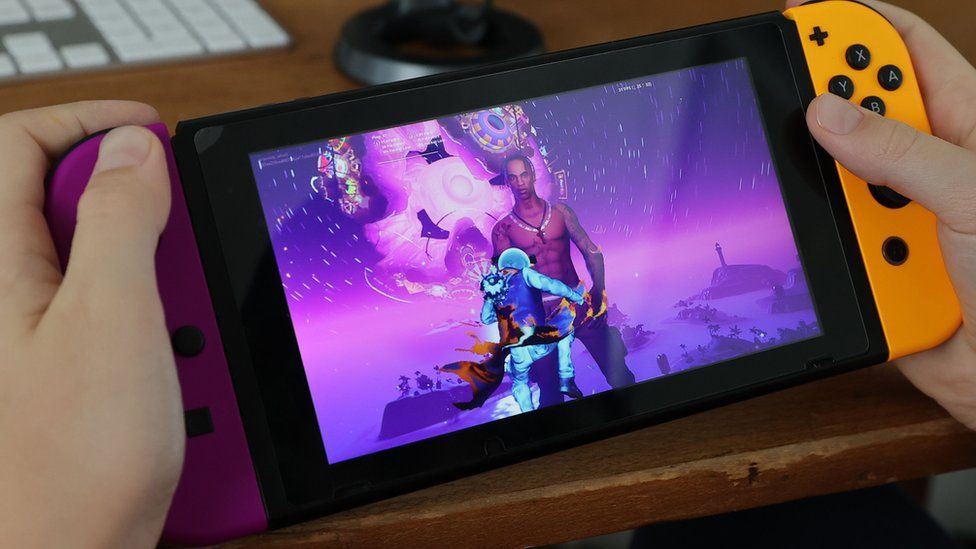Fortnite's Travis Scott virtual concert watched by millions
- Published

More than 12 million players logged in for Fortnite's concert featuring Travis Scott, with reviewers calling it "stunning" and "spectacular".
It included a skyscraper-sized version of Scott teleporting across the landscape as he performed his songs.
Fortnite is one the world's most popular games, attracting millions of young players from across the globe.
Scott used the opportunity to reveal a new song, while players celebrated the event with themed in-game items.
The award-winning artist has sold tens of millions of records in his career, and was due to perform at the world-famous Coachella music festival this summer before it was postponed.
Those who missed the digital debut, however, can catch "encore" performances at the weekend.
A digital version of Scott performed a fully-animated, scripted 10-minute set - shorter than a concert performance.
As Scott moved from song to song, his virtual avatar changed - first into a cyborg, then a fluorescent spaceman.
Allow Twitter content?
This article contains content provided by Twitter. We ask for your permission before anything is loaded, as they may be using cookies and other technologies. You may want to read Twitter’s cookie policy, external and privacy policy, external before accepting. To view this content choose ‘accept and continue’.
The landscape shifted and crumbled around players on an enormous scale.
After it was over, Scott tweeted: "Honestly today was one of the most inspiring days. Love every single one of you guys."
In December, Tim Sweeney, the billionaire chief executive of Epic Games was asked on Twitter: "Do you view Fortnite as a game or as a platform?"
His answer was telling, and possibly a hint at what was in the pipeline.
"Fortnite is a game. But please ask that question again in 12 months."
The Travis Scott concert was probably in development back then, and can now go down as the most successful live event the game has ever staged.
You can easily imagine larger and more immersive events in the future and some crystal ball gazers are now seeing Fortnite as a lot more than a game and possibly a major player in virtual reality if they can get the technology right.
It all sounds like the prologue to the book Ready Player One about a metaverse where people play, socialise and live their lives online.
However, there could be another reason that Epic is pushing in this direction. It's still one of the most popular video games in the world but competition is fiercer than ever with the likes of Warzone and Valorant on the rise.
It's been a year since the company announced it had 250 million registered players, which is roughly the same size as Snapchat's userbase.
Could these events be a sign of the company diversifying in an effort to keep people interested and entertained?
It is not the first time Fortnite has staged a virtual concert, having hosted Marshmello early last year, as well as a Star Wars tie-in and other live events.
Technology site the Verge wrote that while the Marshmello experiment "was an exciting, dynamic example of what a virtual concert could look like", Scott's show "blew it out of the water".
Forbes labelled the show a "stunning spectacle" that offered a glimpse at Epic Games' "metaverse" concept for the game.
Epic said that more than 12.3 million players participated in the event at the same time, which it said was an all-time record.
- Published4 February 2019
- Published22 April 2020
- Published15 April 2020
- Published14 February 2020